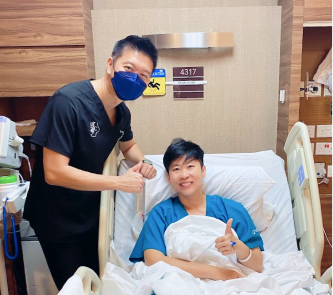Knee Cartilage Injury

The knee joint is the largest joint in the body, consisting of complex structures that enable it to perform various functions ranging from flexibility and movement to weight-bearing and shock absorption. These structures include the cartilage, which protects the knee joint by serving as a cushion to absorb shock and reduce friction between bones.
A knee cartilage injury typically results from factors such as ageing, overuse, trauma, or recurring strain. The symptoms and respective treatments can vary widely, primarily dependent on the severity of the injury. The potential severity of these injuries underscores the importance of understanding them while maintaining a proactive approach toward knee health.
The clinical presentation of a knee cartilage injury can vary greatly, primarily depending on the nature and severity of the damage. However, several common indicators may signal a potential cartilage injury. These symptoms include:
- Persistent pain, either sharp or dull in nature that intensifies during movement or activity
- Tenderness and swelling around the knee joint
- Stiffness or a locking sensation in the knee, leading to limited mobility
- A clicking or popping sound or feeling, particularly during movement
- Reduced range of motion, impeding normal knee function
- Joint instability, which may present as a feeling of the knee 'giving way'
- Difficulty bearing weight on the affected knee
Here are some of the common types of knee cartilage injuries:
- Articular cartilage injury – This refers to damage to the smooth tissue that covers the ends of the bones in the knee joint. It is often caused by natural wear and tear, trauma, overuse or degenerative diseases such as osteoarthritis.
- Meniscus tear – This refers to a tear in the C-shaped cartilage in the joint (meniscus) that serves as a shock absorber between the shinbone and the thigh bone. It can be caused by the sudden twisting or rotating of the knee or force or even simple movements like kneeling and squatting.
- Osteoarthritis – Also known as “wear and tear arthritis,” osteoarthritis is a degenerative joint disease in which the cartilage in the knee begins to break down over time.
- Osteochondritis dissecans – This is a condition in which the underlying bone of the knee’s cartilage becomes loose due to lack of blood flow. Although its cause is unknown, it is often linked to repetitive trauma or stress to the bones, low vitamin D, and genetic predisposition to the condition.
- Chondromalacia patella – Colloquially known as “runner’s knee,” chondromalacia patella refers to the softening or swelling of the cartilage lining the underside of the kneecap. This condition is commonly caused by the overuse of the knee, poorly aligned bones and muscles around the knee joint, infection in the knee joint, and trauma or injury to the knee.
- Patellar dislocation – This occurs when the patella (kneecap) slips out from its natural position at the vertical groove at the knee joint, typically due to a sudden change in the direction or turn that twists the knee. In some cases, patellar dislocation may be congenital, commonly due to developmental abnormalities.
- Age – As we grow older, the cartilage in our knee joint naturally weakens and becomes more susceptible to injuries.
- Gender – Research indicates that women, particularly those middle-aged and above, are more prone to certain types of knee cartilage injuries than men. This may be linked to women having wider hips, which changes the alignment and mechanics of their lower bodies, placing more pressure on the anterior cruciate ligament (ACL). Aside from this, oestrogen fluctuations – which has effects on the musculoskeletal system – can also make women more susceptible to injuries.
- Genetics – Certain genetic factors can predispose individuals to knee cartilage injuries. For example, some people may be born with weaker or less elastic cartilage, rendering them more susceptible to injury.
- Trauma – Direct injury to the knee joint, including forceful twisting or bending, can result in cartilage damage. Such injuries are common in contact sports or accidents.
- Overuse – Chronic stress on the knee joint can lead to cartilage damage over time. This is particularly prevalent among athletes and individuals who regularly engage in activities that involve frequent running, jumping, turning, and pivoting.
- Obesity – Obesity or being overweight significantly increases the stress on the knee joint, contributing to an elevated risk of cartilage injury.
- History of knee injuries – Individuals with a history of knee injuries are at increased risk of subsequent ones, including knee cartilage injuries.
- Pre-existing medical conditions – Certain medical conditions, such as arthritis, can exacerbate the risk of knee cartilage injuries due to the added joint inflammation and degradation.
Diagnosing knee cartilage injury typically involves a multi-step process that includes a physical examination and various imaging tests:
- Medical history review – A consultation typically begins with a review of the patient’s medical history and symptoms. The doctor may ask if the patient has had any previous knee issues, partakes in high-risk activities that could lead to a knee injury, or if there is a family history of knee problems.
- Physical exam – The orthopaedic doctor will also conduct a visual and physical examination of the knee joint. This involves assessing the joint for signs of discomfort, swelling, tenderness, and limited mobility.
- Imaging tests – In order to rule out other injuries and accurately pinpoint the location and severity of the injury, the doctor may order imaging tests such as X-rays, computed tomography (CT) scans, or a magnetic resonance imaging (MRI).
- Arthroscopy – In some cases, a doctor may perform an arthroscopy. This minimally invasive procedure involves inserting a thin instrument equipped with a light and camera into the knee joint through a small incision. This allows the doctor to directly examine the interior of the knee and assess for cartilage damage.
The treatment for knee cartilage injuries will depend on the severity of the injury, and range from conservative treatments to surgical interventions.
- RICE method – The RICE (rest, ice, compression, elevation) method is recommended for mild knee cartilage injuries. This involves resting the knee and abstaining from activities that could exacerbate the pain; icing the affected area to reduce pain and swelling; compressing the area to limit inflammation; and elevating the knee joint above the heart level to alleviate swelling.
- Medications – Pain relief medications and non-steroidal anti-inflammatory drugs (NSAIDs) may be prescribed to manage the pain and swelling. For more severe inflammation and pain, corticosteroid injections may be given.
- Cartilage Surgery – Surgery is performed in cases where the damage is serious and symptoms cannot be alleviated through conservative treatments. This is especially applicable in cases where the cartilage or other bone or tissue in the knee joint needs to be repaired or removed. Common cartilage surgeries include arthroscopy, microfracture surgery, and osteotomy.
- Physiotherapy – A physiotherapist will tailor a set of exercises that are designed to enhance the strength, flexibility, and mobility of the knee joint. These exercises can also help reduce the risk of future knee problems.
This will depend on the location and severity of the injury, the patient’s adherence to rehabilitation, the patient’s age and natural healing process,as well as the type of cartilage repair procedure performed.
For mild injuries of the knee cartilage, the healing process can range from 6 weeks to 3 months. On the other hand, the complete recovery period after surgery may range from 9 to as long as 18 months.
- Regular exercise – Regular physical activity helps one maintain a healthy weight and strengthen the leg muscles, both of which can alleviate stress on the knee joint and consequently reduce the risk of knee cartilage injury.
- Proper exercise techniques – Ensuring you adopt the correct form and techniques during sports activities and exercises can protect your knees from undue stress. Additionally, incorporating warm-up and cool-down routines can aid in injury prevention.
- Appropriate footwear – Wearing well-fitted shoes that offer robust support and cushioning can help reduce the impact and stress on your knee joints during walking, running, participating in sports, and doing daily activities.
- Adequate rest – Regular breaks during the day and intervals in between physical activities can help prevent injuries related to the overuse of the knee joints.
- Balanced Diet – A healthy and well-balanced diet aids in maintaining an optimal weight, reducing obesity risks, lowering inflammation in the body, and lessening the chances of knee cartilage injury.
For a personalised and effective treatment for knee injuries, including cartilage repair, ligament reconstruction, and knee replacement, please contact us at 9898 7781.
FRCSEd (Orth), FAMS
Dr Kevin Koo is an experienced knee surgeon with over 20 years of experience treating cartilage injuries of the knee. Dr Koo completed a fellowship at St. Mary's and Charing Cross Hospitals, Imperial College Healthcare in London, UK, where he worked with internationally recognised orthopaedic surgeons and treated professional athletes and dancers.
His practice interests include foot and ankle surgery, joint replacements, sports and minimally invasive surgery. He has presented extensively at international, regional as well as local conferences including the prestigious American Academy of Orthopaedic Surgeons (AAOS) as well as the British Society for Surgery of the Hand (BSSH) Annual Scientific Meetings.



| Tel. | : +65 6970 5905 |
| Fax | : +65 6970 5906 |
| Mobile | : +65 9898 7781 |
| : hello@bjc.sg, drkevinkoo@bjc.sg |
| Mon - FriMonday -Friday | : 8:30am to 5:30pm |
| Sat, Sun and PHSaturday, Sunday & PH | : Closed |
Well-being: Our Focus at
The Bone & Joint Centre.
We know that getting back to the activities you love is what truly matters. We are committed to providing high-quality, compassionate care to help you regain the ability to live life to the fullest.
Call us at 9898 7781 or fill out the form below and we will
get in touch as soon as possible.
| Tel. | : +65 6970 5905 |
| Fax | : +65 6970 5906 |
| Mobile | : +65 9898 7781 |
| : hello@bjc.sg, drkevinkoo@bjc.sg |
| Mon - FriMonday -Friday | : 8:30am to 5:30pm |
| Sat, Sun and PHSaturday, Sunday & PH | : Closed |





